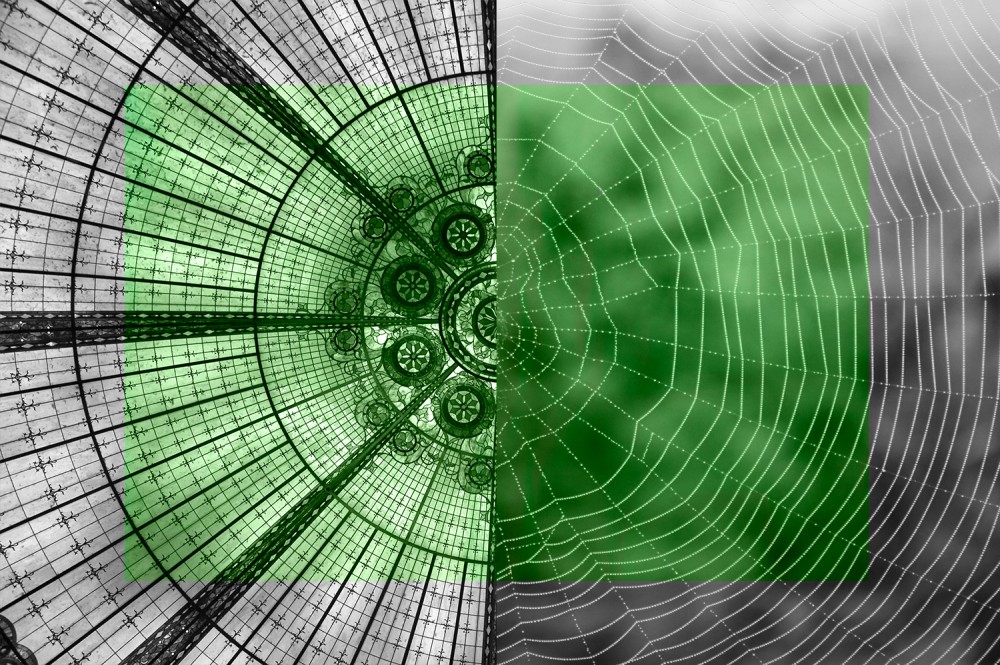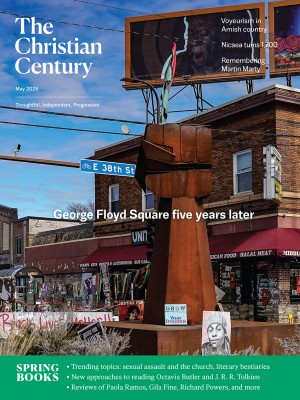Longing for faith with Marilynne Robinson
Her essays present a Christianity that sits comfortably with mystery, that reaches out to neighbors as well as up toward God.

Century illustration (Source images: Getty and Unsplash)
My desire for faith is always strongest when I think about death. I imagine this is common; the promises that Christianity makes about death are radical and beautiful and utterly wild. “Why would you believe in something horrible,” asks Fleabag’s Hot Priest—eternal nonbeing, he means—“when you could believe in something beautiful?” It’s among my central sadnesses that despite having been raised in a faith, despite having put myself in the way of faith over and over again, it hasn’t ever quite worked that way for me.
Christianity has a complicated relationship to our life here on earth. The here and now is said to pale in both length and beauty to a life hereafter, an idea expressed well by “Amazing Grace”: “When we’ve been there ten thousand years, / bright shining as the sun.” Too long to contemplate, too bright to look at directly. But earthly life is the place where we secure that later eternity, where all the struggle and heartbreak and work happens.
Read our latest issue or browse back issues.
So much of the work inherent in a Christian life is appealing to me. I am working to build a world where loving my neighbor as I love myself has a concrete, shaped meaning. I try to center the least of these in every decision I make. I try not to lie, covet, or hold anger and resentment in my heart; I try to forgive. I fail at these things all the time, of course, in all the little ways that are so common and in some bigger ways that trouble me. But there is so much of this life that I’m trying to make beautiful and fulfilling that most of the time, not believing in a world hereafter doesn’t feel like much of a loss. Yes, dying scares me, but there’s so much left to do—and seemingly so much time left to do it in—that I don’t pause to think about this aspect of faith very often. And yet.
I think I miss the idea of faith the most after I’ve read a Marilynne Robinson book, especially her nonfiction. I joke that every time I read her, I emerge a kind of supercharged Calvinist for about three weeks, until whatever intense Protestant molecule I have within me has returned to its regular state. This is mostly a joke, but it also kind of isn’t.
Compared to her novels, Robinson’s essays run dry and muscularly intellectual, and many are rigorous and thoughtful reflections of her Calvinist faith. I don’t always agree with her. I know that a certain kind of Calvin devotee has done a lot of harm to people. And I’m one of those people—some of my deep ambivalence toward religion stems from sitting through a ham-fisted sermon on predestination, of all things, in my youth group. Perhaps no one is ever really ready to wrestle with predestination. I guarantee you that a group of 15-year-olds are not.
I think the reason I love these essays so much is that they argue for a kind of faith that lifts the ceiling off the church, that sits comfortably next to mysteries, that reaches out to neighbors as well as up toward God. Robinson’s expression of Calvinism avoids easy conclusions or intellectual laziness; her arguments are rigorous and thorough. Yet hers remains a faith of the everyday, seemingly unconcerned with choirs of angels or eternal salvation or even hell—this, I think, is the part of faith that her novels best reflect. Her commitment to Iowa, her desire to see it live up to the ideals of its founding, feels like nothing so much as a kind of Benedictine vow of stability: feet planted in a specific plot of soil, a commitment to see it through its changes rather than set out for somewhere brighter and shinier. It’s a beautiful investment in a very specific here and a very specific now. This appeals to me because it’s the part of all of this that I can handle, doing my best to get it right in the here and now.
While writing this, I stumbled down a little wormhole trying to find the origins of the quote, “There is another world, and it is this one.” In a Public Seminar article, McKenzie Wark points out that while it is often attributed to poet Paul Éluard, it actually comes from novelist Patrick White, who in turn found it elsewhere and edited it in what the Surrealists called a détournement: a “rerouting” of an existing work to create a new one. It’s a kind of sideways citational practice that acknowledges the disruptions in meaning and intention that comes from our engagement with the work of other minds.
There’s a way in which my relationship to Christianity feels like a détournement, a rerouting to avoid the things I have tried so hard to believe and been unable to, my own grappling with and rewriting of a whole set of stories and ethics and beliefs that were handed to me as a child. Robinson’s work urges me not to discard it but rather to keep my feet planted in the faith that raised me, to enrich the soil by returning to it my thought and my effort and my intention, to not go wandering off in search of brighter and shinier pastures.
The Éluard/White apocryphal quote—and its discursive little path into the world—might come the closest to what I am trying to say here. There is another life, and it is this one; there is another world, and it is this one that we make. I am after a way to live out some kind of ethics, some kind of shortcut-that-isn’t-a-shortcut to being a good person, to inhabit my own rind of the world as best I can, open to mysteries but not pinning my existence on them.






